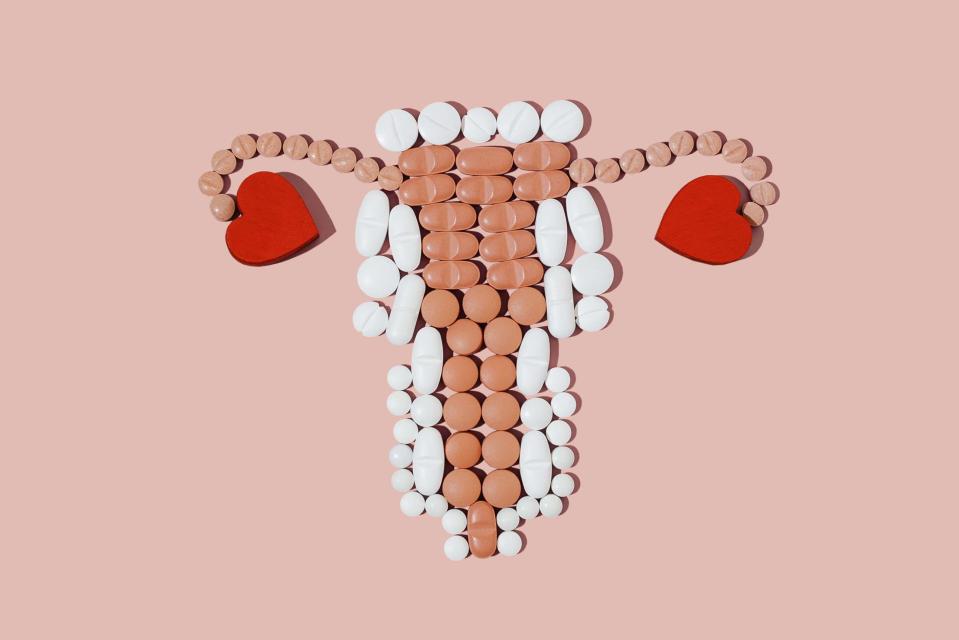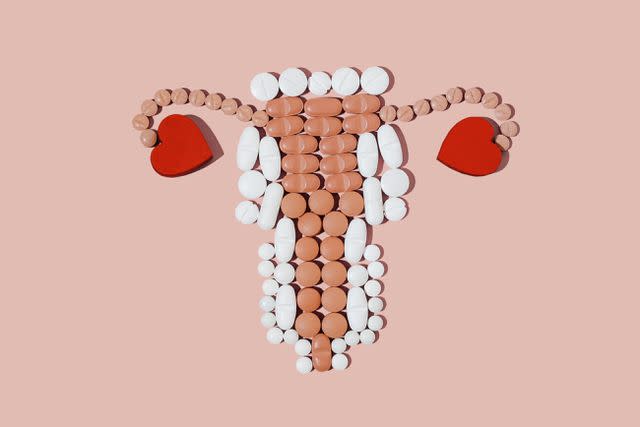You Can't Actually 'Balance' Your Hormones—But You Can Help Manage Their Natural Ups and Downs
Learn ways to temper the effects of hormonal shifts, from your 30s through menopause, and beyond.

Yulia Reznikov/Getty Images
When we say someone is “hormonal,” that person is typically a woman, and she's usually having an outsize emotional reaction—sobbing over a lost-dog post or engulfed in a white-hot rage because no one else in her household can load the *$&#ing dishwasher correctly.
But the female reproductive hormones—estrogen (which plays an essential role in the menstrual cycle) and progesterone (which prepares the body for pregnancy)—shouldn't be written off as unstable drama queens. In addition to controlling periods and all things childbearing, they affect our skin, bones, brain, potato chip cravings, and more. And when these mercurial hormones fluctuate and eventually decline, we may realize that, like hardworking moms, they did more than we ever knew.
Related:9 Myths About Menopause, Debunked by Experts
Dealing with hormonal ups and downs isn’t exactly enjoyable, but we do have some good news: Knowledge is power. So while everybody’s experience is different, from period problems to menopause and beyond, we’ve rounded up facts—fun and otherwise—that can give you the upper hand.

Yulia Reznikov/Getty Images
You Can't Technically Balance Your Hormones
Social media influencers and wellness books are chock-full of advice about how women can manage their physical and emotional symptoms by "balancing" their hormones, but that idea is a myth, says Mary Claire Haver, MD, an ob-gyn in Houston who specializes in menopause.
“‘Balancing hormones’ is a marketing term, not a medical term,” Dr. Haver says. “Every woman’s hormones, even during the most normal reproductive phases, fluctuate day to day.”
Estrogen and progesterone are dancing a constant tango, and as their levels dip and rise throughout the month, they affect other hormones and neurotransmitters in the process.
Still, there’s no need to suffer: If you have hormone-related symptoms that are getting in the way of your life—think: extreme fatigue, breakouts, hot flashes, mood swings—see your doctor, who may recommend lifestyle changes or pharmaceutical solutions, such as birth control pills.
Lifestyle Habits to Ease Hormonal Symptoms
You might not be able to control your hormones, but you can take control by adopting some healthy behaviors to make the hormonal roller coaster ride a bit more comfortable.
Nutrition: Prioritize anti-inflammatory foods.
Wine and doughnuts may be exactly what your hormones are calling for—and if you give in to their siren song, no judgments. That said, food and drink choices can be an effective way to mitigate pesky hormonal symptoms. “I also trained as a culinary medicine specialist, and here’s a thing that stuck with me: Nutrition is the most under-utilized preventive medication, but it’s also the most effective," Dr. Haver says.
Her book The Galveston Diet outlines the eating plan that’s helped thousands of people manage hormonal symptoms beyond just changes in weight or shape, she says. “If you can make an anti-inflammatory diet your habit, that can really help you manage the menopause transition.”
Eating anti-inflammatory foods—berries and leafy greens; healthy fats, like nuts, seeds, and olive oil; and fish packed with omega-3s, like salmon and light tuna—is important for women as they age, because declining levels of estrogen and progesterone rob the body of some natural protection against inflammation (which can affect your knees, mood, libido, you name it).
Related:Red Alert: These Are the 4 Worst Foods That Cause Inflammation
Movement: Mix in both cardio and strength training.
Exercise is essential too. It can help with anxiety and depression, as well as the host of changes that can crop up when estrogen begins to fly the coop, including bone loss, decreased muscle mass, and higher blood pressure, and cholesterol. “Especially as we get closer to menopause, we want strong bones and muscles, so that means resistance training, and a healthy heart, which means cardio,” Dr. Haver says.
Related:Balance Declines as We Age—Here Are 8 Helpful Exercises for Lasting Stability
"Nutrition is the most under-utilized preventive medication, but it’s also the most effective."
Stress: Find management tools that work for you—and return to them often.
Don’t forget about stress reduction. Unchecked, chronic (a.k.a. systemic) stress is hazardous for overall health in a number of ways. It can affect immune system functioning, energy levels, mood, and put you at risk for more serious illness down the line. The key is to find stress-busting practices and activities that really work for you and that you can return to regularly to quell stress—which will always be a part of life. Yoga, bubble baths, walking, dart throwing, breathing exercises, prayer, wreath making—literally whatever works for you—to get you out of fight-or-flight and into that rest-and-digest state. And don't skimp on getting adequate rest.
Related:Our Sleep Needs Change a Lot as We Age—Here's How to Get Proper Sleep in Your 20s, 30s, 40s, and 50s
You Have Several Medical Options, Too
Did you know that premenopausal symptoms can start as early as your 30s? Medically speaking, you’re not in menopause until you’ve gone 12 months without a period (only 1 percent of women experience this before age 40). In your late 30s, it’s more likely you’re in perimenopause—the run-up, when the ovaries make less and less estrogen and when progesterone levels can plummet, producing symptoms like irregular periods, brain fog, mood swings, and hot flashes. Perimenopause can last 7 to 10 years, says Monica Christmas, MD, associate professor of obstetrics and gynecology at the University of Chicago Medicine. Given that most women experience menopause between ages 40 and 58 (the overall average is 51), women in their 30s could very likely experience symptoms related to “the change,” as your mother may have called it. And your general practitioner might not realize it, Dr. Christmas adds: “It’s not unusual for someone in their late 30s or early 40s to start having some of these symptoms, ask a medical professional whether it’s menopause related, and get dismissed with ‘Oh, you’re too young. It can’t be.’ But often it is.”
But there’s no simple way to determine how close you are to menopause. Because hormones change over the course of a month, and because everyone’s physiology is different, numbers alone won’t mean much. “One test isn’t going to give the full picture, especially if your periods are getting wackier and we can’t be sure where you are in your cycle,” says Mary Jane Minkin, MD, clinical professor of obstetrics, gynecology, and reproductive sciences at Yale School of Medicine. “We can do a second test, and the combined results may suggest perimenopause. But nobody can tell you when your last period will be.”
Birth control pills can be a good option for irregular periods and hormone roller coasters.
“They regulate periods and keep your hormones at a steadier level, versus the extreme highs and lows that trigger a lot of symptoms, and the estrogen helps prevent hot flashes,” Dr. Minkin says.
Grab OTC eye drops for dry eyes.
Hormonal shifts can leave even your eyeballs feeling gritty—seriously! (If over-the-counter eye drops don’t cut it, see your ophthalmologist.)
Ask your doc about a vaginal moisturizer.
Also, collagen loss picks up speed as hormones decline, causing your skin to become less elastic and thinner, which you may notice not only above (and on, and under) your neck but also below the belt. Vaginal tissues may become inflamed and irritated, says Dr. Christmas, who recommends talking with your doctor about a vaginal moisturizer. Applied regularly, it helps the cells in your tissues retain moisture. Check out a brand such as Replens, designed to be used every three days, or Revaree, a hyaluronic acid suppository you can insert before bed. For more intensive relief, ask your doctor about prescribing a topical estrogen cream, or consider hormone therapy. As for the rest of your skin, look for products with hyaluronic acid or squalane, which helps skin hold on to moisture.
Related:Ask a Beauty Editor: What Happens to Your Skin During Menopause—and the Best Products for It
“People should not despair. There are things we can do to get you better.”
Hormone therapy is a lot safer than you may think.
Hormone therapy (HT)—in which estrogen or a combo of estrogen and progesterone is administered through pills, patches, or a gel—got a bad rap in 2002, when part of a large-scale study in postmenopausal women was halted after some subjects developed an increased risk of breast cancer and blood clots. The news scared many patients and their doctors away from HT practically overnight. But in the panic, key facts were overlooked: First, the subjects’ average age was 63, while most women who seek hormone therapy are in their 40s or 50s and therefore less prone to strokes and blood clots.
As for breast cancer, the increased risk while on HT was less than 0.001 percent per year. The latest recommendation from the North American Menopause Society is that as long as you start HT no more than 10 years after hitting menopause, or before age 60, the risk-benefit ratio favors HT for reducing hot flashes and preventing bone loss. If you have no history of breast cancer or heart or liver problems, you should be a good candidate. “I like to prescribe HT in patch form, which has even less blood clot risk than a pill,” Dr. Haver says. “It can help with hot flashes, painful sex, and bladder issues.”
There are pharmacological options besides hormones.
The new drug fezolinetant, a nonhormonal treatment for hot flashes, is being reviewed by the FDA. “A drug like this could be a game changer for people who can’t or don’t want to do HT,” Dr. Christmas says. In the meantime, discuss other options with your health care provider. Low doses of the antidepressant paroxetine may help reduce hot flashes and improve sleep without squashing libido or causing weight gain. The antiseizure drug gabapentin can also help with hot flashes. If brain fog is your issue, “there’s been some interesting research on Adderall and other ADHD drugs,” Dr. Minkin says. “People should not despair. There are things we can do to get you better.”
Find a new doctor who can truly help.
In a small 2019 study of residents in family medicine, internal medicine, and obstetrics and gynecology, less than 7 percent reported that they felt prepared to treat menopausal patients. Another small study of ob-gyn residents revealed that only 20 percent had received menopause training. The study about the negative effects of HT came out shortly before the push to give medical residents less punishing schedules, Dr. Minkin adds, which made it all too easy to cut menopause lessons from some curricula.
To find a provider suited to this time in your life, check out the North American Menopause Society directory. Also, a number of online companies have sprung up to fill in the knowledge gap—Womaness, Gennev, and Midi, to name a few—many of them founded by women who had looked, unsuccessfully, for support when they reached perimenopause themselves.
“Women are saying, ‘There has to be a better solution, so we’re going to create the solution,’” says Michelle Jacobs, cofounder of Womaness, which offers information from a team of endocrinology, sleep, and fitness experts, along with an online community and products that address concerns such as skin changes, vaginal dryness, and brain fog. “The generation that’s heading into perimenopause and menopause openly talked about a lot of issues—infertility, for instance–and now there’s so much more in terms of awareness and solutions,” Jacobs says. “I think that’s where menopause is headed.” We're here for it.
For more Real Simple news, make sure to sign up for our newsletter!
Read the original article on Real Simple.

